Click here to view the photo album.
The Voice of Knowledge and Innovation – Challenges, Opportunities and Actions
1. Meeting Opens Amidst National Tragedy
The 15th Annual Senior International Leaders’ Meeting (SILM) discussed the strategic direction of APRU and updated members with the progress of initiatives and recent innovations in higher education.
Dr. José Manuel Páez, Vice Rector for International Affairs at Tec de Monterrey, welcomed fellow academic leaders, updating delegates on the previous day’s tragic earthquake before opening with a message of global cooperation, envisioning a more just world through cutting edge ideas.
Co-Chairs of the International Policy Advisory Committee, Prof. Cindy Fan, Vice Provost for International Studies and Global Engagement at UCLA, and Prof. Jiro Kokuryo, Vice President for International Studies and Global Engagement at Keio University, welcomed attendees to the two-day conference.
In a separate statement, Professors Fan and Kokuryo joined APRU General Secretary in expressing their condolences to the Tec de Monterrey colleagues and friends in Mexico.
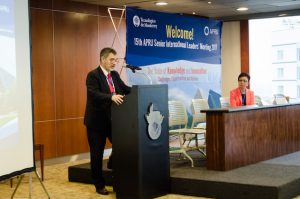
Vice Rector Dr José Manuel Páez shares his vision for innovation in higher education.
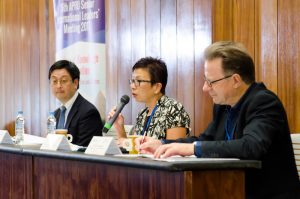
Prof Cindy Fan (middle) and Prof Jiro Kokuryo (left) welcome delegates to the 15th SILM.
2. Current Issues in Higher Education in Latin America
Latin American institutions responded to a shifting employment landscape with new educational models, to keep pace with the changing skill-demands faced by fresh graduates.
Tuning Academy
Pablo Beneitone, Director of the Tuning Academy, University of Duesto introduced the Tuning Academy, a global consortium of universities looking to update higher education for 21st century needs.
The Academy works to develop curricula that better matches the needs of an advanced workforce. In order to accomplish this, the Academy will develop a framework of comparable and compatible qualifications, the Bologna Tools, to deploy through its regional initiatives. Through regional initiatives (Tuning Southeast Asia, Tuning China etc.), the Academy plans to adapt its model to suit local requirements on the ground.
Tec21 Educational Model
José Escamilla, Director of TecLabs (the disruptive educational innovation unit of Tec de Monterrey), presented the Tec21 model, which aims to reform higher education to provide the skills needed for a twenty-first century labor market.
The model exposes students to real-world problems, with an emphasis on sustainability and inter-disciplinary learning. Alongside technical competencies, the model looks to expose students to civics, ethics, critical thinking and a breadth of different cultures, teaching in both Spanish and English.
3. 21st Century Workforce: A Case Study of the Technológico de Monterrey
Showcasing pedagogical innovation in practice, hosts Tec de Monterrey shared their experiences from the Tec21 example.
Tec21 Innovation Week
José Manuel Páez, Vice-Rector for International Affairs of Tec de Monterrey, unveiled Innovation Week, a Tec21 student hackathon geared towards health and safety, clean energy and intelligent cities. The hackathon plans to host a series of workshops and conferences to connect students with leading experts in their fields.
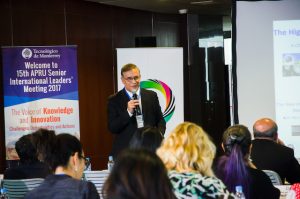
Prof Jaime Bonilla shares his experiences of the Tec 21 Educational Model
during the second session of the 15th APRU SILM.
Tec21 in Action
Jaime Bonilla, Associate Dean of Continuing Education and International Affairs at Tec de Monterrey, explained the need to update education methods and infrastructure for a new generation of digital natives. Meanwhile, Pedro Nájera, Professor of Electrical and Computer Engineering and winner of the 2016 Inspiring Professor Award, shared classroom examples of Tec21 in action.
4. APRU Vision—The Voice of Knowledge and Innovation: An Overview
APRU Secretary General reviewed the year’s strategic direction, briefing delegates on the year’s progress towards long-term, strategic goals.
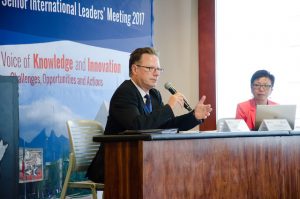
APRU Secretary General Christopher Tremewan provides a strategic
overview of the Association’s goals for 2017 and beyond.
Christopher Tremewan, Secretary General of the APRU, recapped the year’s strategic dialogue and introduced new strategic activities and projects such as the Pacific Ocean initiative and the APEC Project DARE (Data Analytics Raising Employment).
Both initiatives showcase the ways in which the APRU can link members’ expertise to advocacy and policy development through unilateral organizations, such as the UN and APEC.
Dr. Tremewan outlined upcoming APRU initiatives, highlighting the 2018 APRU Impact Report and inaugural APEC University Leaders’ Forum (AULF), Da Nang, Vietnam, November 8.
The Forum focuses on issues of sustainability and closing the skills-gap. APRU’s official partner for the Forum was the Ministry of Education and Training, Vietnam, and university partner Vietnam National University, Hanoi. The Forum is a notable step towards APRU’s goal of connecting research and education to policy impact through engaging with APEC.
The Forum will run alongside the APEC CEO Summit, where business leaders from the world’s most influential companies will join political leaders to discuss the opportunities presented by the Fourth Industrial Revolution. Both events precede the APEC Economic Leaders’ Meeting, where world leaders will to discuss the region’s economic development.
Meanwhile, APRU’s 2018 Impact Report will focus on modes of collaboration between the social sciences and humanities and STEM disciplines to find solutions to Asia-Pacific challenges.
In addition, the Secretary General updated members on APRU’s communications strategy, including the planned development of a new web site following a re-branding project with brand consultant Landor.
Finally, Dr. Tremewan presented the APRU’s collaborations with partners. He highlighted the APRU’s continuing collaboration with Elsevier, its engagement with APEC bodies, as well as recent and planned projects with the NYT, Google and AT&T.
5. APRU Enhancing Impact
APRU’s lead-collaborators and representatives presented the year’s progress in ongoing activities.
Sustainable Cities and Landscapes
Dennis Galvan, Vice Provost for International Affairs of the University of Oregon, updated members on the Sustainable Cities and Landscapes Hub, sharing details from new projects and the recent, inaugural APRU Sustainable Cities and Landscapes Conference.
Working groups formed at the conference aim to publish the conference’s first edited volume—a collection of studies and white papers to help inform policy. The ten working groups will each tackle a key aspect of sustainable living in the finished volume.
Additionally, the Hub seeks to introduce specialist courses, tailored to city planners and government officials across the region. In planning the course, the Hub drew inspiration from the Sustainable Cities Year Program (SCYP), developed by the University of Oregon. The Hub hopes to replicate the SCYP’s modus operandi across APRU, adapting existing university courses to better match a city’s sustainability needs.
Multi-Hazards
Takako Izumi, Associate Professor with the International Research Institute of Disaster Science (IRIDeS) at Tohoku University and Program Director of the APRU-IRIDeS Multi-Hazards Hub, reported on new, cross-border contributions to Disaster Risk Reduction (DRR).
The GNSS Tsunami Early Warning System Workshop, hosted by the APRU-IRIDeS Multi-Hazards Hub with support from NASA, aims to explore the potential for a regional tsunami warning system. To develop compatible systems, the two-day workshop sought to understand the data needs of different countries on the Pacific-Rim. To improve on existing systems, the workshop reviewed state-of-the-art early warning systems.
Separately, the Elsevier report on disaster science research is due to be launched during the first World Bosai Forum on disaster risk reduction on November 26, 2017.
Global Health
Mellissa Withers, Assistant Professor with the Institute for Global Health at the University of Southern California, and Program Director of the APRU Global Health Hub, updated delegates on the experiences of Global Health LIVE!, the Hub’s program of online courses developed for APRU member institutions.
The program now features two courses, Global Health Leadership and Global Health Ethics, helping to bridge the gaps between research, practice and policy. The program’s courses set themselves apart by involving leading experts from government, the private sector and NGOs such as the World Health Organization.
Under the program, the Virtual Global Health competition engaged students both in and beyond the APRU network on real-world issues in Global Health. Currently, the competition involves 38 teams across 19 universities on issues of tobacco control, a near-four-fold increase from the previous year.
Global Health LIVE! augments health education by using new distance-learning tools and hosting events with leading experts, giving students exposure to the cutting edge of research and practice.
Proposed Hubs
Nasruddin Yusuf Rodjali, Head of the Department of Mechanical Engineering at the University of Indonesia, proposed a new research hub, the Cluster of Renewable Energy (CoRE), providing a six-year roadmap.
Potentially hosted by the University of Indonesia’s Tropical Renewable Energy Center (TREC), the outlined hub would link research in support of the United Nations Sustainable Development Goal #7 (SDG7): to ensure access to affordable, reliable, sustainable and modern energy for all. The proposed hubs would aim to develop policies, guidelines and standard operating procedures by 2020.
The initiative looks to create a new international conference and workshop to advocate for the development and adoption of renewable energy systems. Member unviersities were asked for expressions of interest in joining the core group to plan the initiative which can only be launched if there is sufficient support.
Upcoming Projects
APRU’s Christina Schönleber, Director of Programs & Policy, and Jackie Agnello Wong, Marketing and Business Development Manager, informed members of a Google-backed AI research projects, as well as a student-hackathon supported by AT&T.
6. Challenges, Opportunities and Actions
APRU introduced new models to further research and advocacy, for more effective policy impact.
The Pacific Ocean
Chair Kathy Belov, Pro-Vice-Chancellor of Global Engagement of the University of Sydney, asked delegates for feedback on initiatives and key areas of interest within oceans-related research.
During an interactive session, members were invited into working groups to and discuss areas of focus and opportunities for collaboration.
The Pacific Ocean initiative is an evolution of prior APRU programs, connecting members’ ongoing research to the United Nations Sustainable Development Goals #14 (SDG14): to conserve and sustainably develop the world’s oceans. The initiative would support SDG14’s implementation in the Pacific.
APEC Engagement
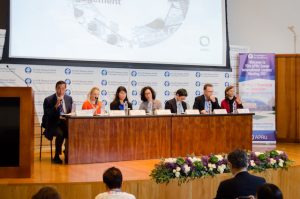
APEC collaborators Debbie Hughes, Tracy Huang, Lydia Cheng
(2nd, 3rd, 4th from left) present APEC’s Project DARE.
APEC collaborators Debbie Hughes, Tracy Huang, and Lydia Cheng introduced the APEC Data Analytics Raising Employment (DARE) project.
The DARE framework looks to address a projected shortfall of Data Science & Analytics (DSA) talent in a rapidly changing labor market.
The project aims to introduce and implement a list of core competencies in data sciences along-side a companion toolkit for higher education institutions with the aim to close the skills gap on DSA across the APEC region.
The tools will hopefully enable institutions to match curricula, courses and programs to industry’s evolving DSA needs.
Debbie Hughes serves as Co-Chair of APEC Project DARE and Vice President of the Higher Education & Workforce Business Higher Education Forum (BHEF); Tracy Huang sits on the APEC Project DARE Secretariat, and serves as Associate Director of C&M International; and Lydia Cheng is the US Regional Lead of Digital Custom Solutions at Wiley.
7. Higher Education Policy Challenges and National Contexts
APRU Members shared experiences facing higher education challenges, in different regional contexts.
America
Victoria Jones, Chief Global Affairs Officer at the University of California, Irvine, outlined the challenges faced by higher education in the US. Jones highlighted three main obstacles to overcome, listing uncertainty from federal cutbacks, negative public perception and US international relations.
Chile
Eduardo Vera, Director of International Affairs, University of Chile, presented the CARÉN Initiative, a 1.022-hectare research park planned on the outskirts of the capital city of Santiago. A short distance from Santiago International Airport, the Carén site will promote international collaboration in food science, computer science, biomedicine, disaster science, hydrology and renewable energy.
Hong Kong
John Kao, Vice-President and Pro-Vice-Chancellor (Global) at The University of Hong Kong (HKU), explained how government funding and policy has affected the development of public universities in Hong Kong. In addition, Prof. Kao explained how the government’s policy stance feeds back into HKU’s strategic goal of becoming Asia’s global university.
Korea
Sunhyuk Kim, Vice President of International Affairs, Korea University, allueded to Korean challenges despite the nation’s reputation of high participation rates and research spending. Using cultural context, Prof. Kim affirmed the need for education reform if Korea wants to meet labor market needs in a post-internet era. Prof Kim also commented on Korean government interventionism—touching on tuition, enrollment and education inflation.
8. Next Steps for APRU: Feedback and Takeaways
Closing the year’s Senior International Leaders’ Meeting, attendees highlighted the event’s key developments and shared their thoughts of the two-day conference.
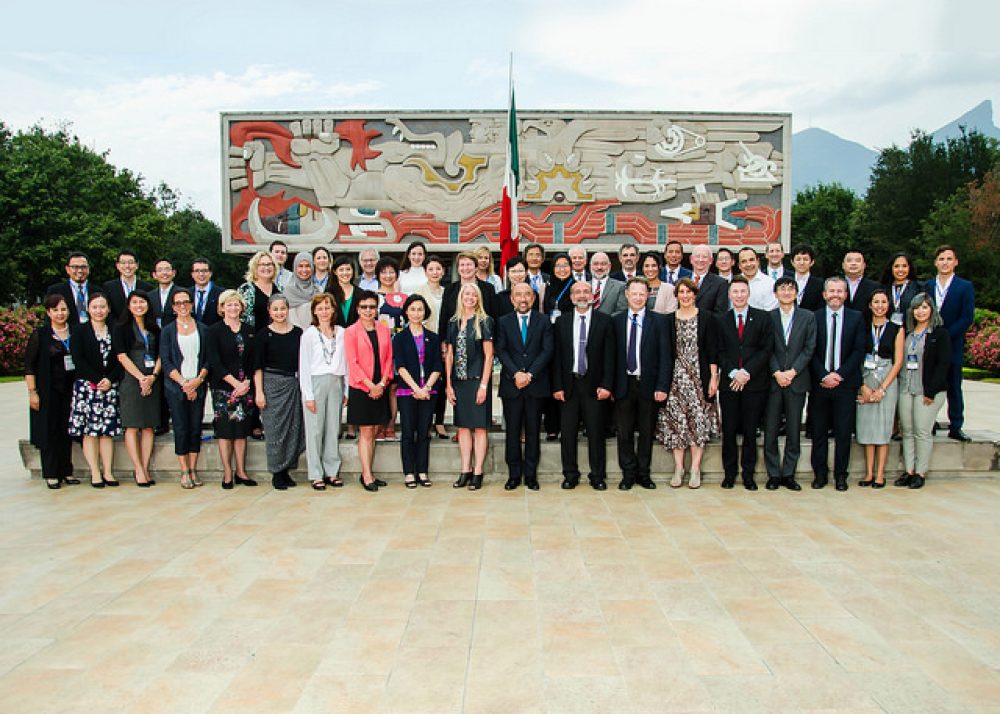
Delegates from across the APRU network traveled to Monterrey for the annual SILM event.
Co-Chairs Cindy Fan, Vice Provost for International Studies and Global Engagement, UCLA, and Jiro Kokuryo, Vice President of International Collaboration, Keio University, concluded the conference with a summary of the two-day’s discussion. Describing the proceedings with the acronym “FIRE”, the pair highlighted the meeting’s themes: Forward-looking, Impact, Resources, Engagement.
When asked for feedback, attendees strongly supported the continued development of year’s direction, moving beyond technology and innovation towards enacting effective societal change. Building on the previous year’s strategic dialogue, members echoed the importance of seeing research through to advocacy, “from lab to legislature.”
In addition, members expressed optimism around the strategic opportunities offered by APRU International Secretariat’s new Hong Kong location.

